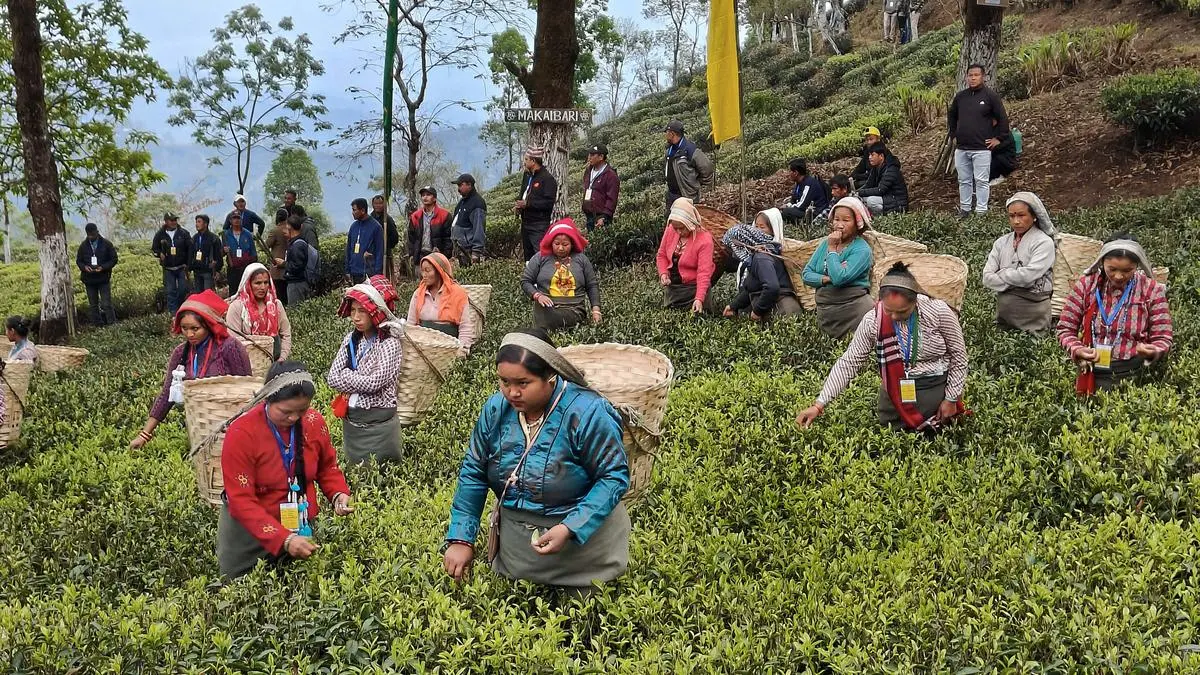Small tea growers’ associations in West Bengal have appealed to the State Government for urgent policy reforms to address limited bargaining power, price distortions, and poor financial access impacting over 50,000 small growers contributing 64% of the region’s tea output.
| Photo Credit:
PTI
Small tea growers’ associations in West Bengal have sought policy intervention from the State Government as the small tea growers have been facing limited bargaining power to negotiate fair prices, price distortion, and limited access to financial support.
The associations have urged the Government to ensure fair and remunerative prices for small tea growers (STGs) in North Bengal, ensure a sustainable floor minimum price for tea, regulate leaf agents through a licensing system, and strengthen financial access and institutional support for STGs.
Significantly, more than 50,000 STGs are cultivating the brew and contributing around 64 per cent of West Bengal’s tea production.
Socioeconomic impact of small tea sector
According to a Status Paper on the Small Tea Sector of West Bengal, the growth and evolution of the small tea sector in North Bengal is a powerful story of resilience and transformation. Small tea growers have navigated numerous challenges to establish tea cultivation as a viable and sustainable alternative to traditional and lower-return crops. This shift has had a significant socioeconomic impact on the rural economy of North Bengal.
However, small landholdings reduce the growers’ ability to negotiate fair prices with leaf agents, bought leaf factories (BLFs), and input suppliers. Also, involvement of multiple intermediaries often results in price distortions, diminishing growers’ earnings.
“Inadequate access to Government schemes available to small farmers, combined with consistently low price realization, threatens the long-term viability of small tea cultivation. If these conditions persist, growers may be compelled to abandon tea farming altogether, posing a risk to national tea supply chains and the livelihoods of thousands dependent on the sector—particularly in remote areas with limited alternative income opportunities,” the status paper said.
This document is a joint initiative of the Confederation of Indian Small Tea Growers’ Associations (CISTA), the West Bengal United Forum of Small Tea Growers’ Associations (WBUFSTGA), and the Jalpaiguri District Small Tea Growers’ Association (JDSTGA).
Financial and agricultural support gaps
According to this status paper, small tea growers in West Bengal have inadequate access to finance for infrastructure development, particularly in processing, storage, and value addition, which increases their dependence on intermediaries.
“Compared to the organized sector, small growers have limited exposure to good agricultural practices (GAPs), extension services, and digital technologies,” the document pointed out.
Ignored price sharing formula
Small tea growers in North Bengal are not receiving fair prices for their green leaf despite the Tea Board’s mandated Price Sharing Formula (PSF)—which requires that 58 per cent of the Net Sale Average (NSA) go to growers and 42 per cent to bought leaf factories (BLFs).
“Due to poor enforcement and lack of awareness, this formula is widely ignored. Unregulated leaf agents—who handle nearly 92 per cent of green leaf produced by small growers annually—act as intermediaries between growers and factories and absorb a large share of the value chain. These agents reportedly operate with no regulatory oversight, compromising both transparency and grower incomes,” said the Status Paper on the Small Tea Sector.
“This status paper contains the challenges and problems of West Bengal’s small tea growers and it clearly states how the State Government’s intervention can change the policy. We have submitted it to the Government. We hope that the Government will take necessary actions to save the small tea growers sector,” Indian Small Tea Growers’ Associations (CISTA) president Bijoy Gopal Chakraborty told businessline.
Published on July 29, 2025
